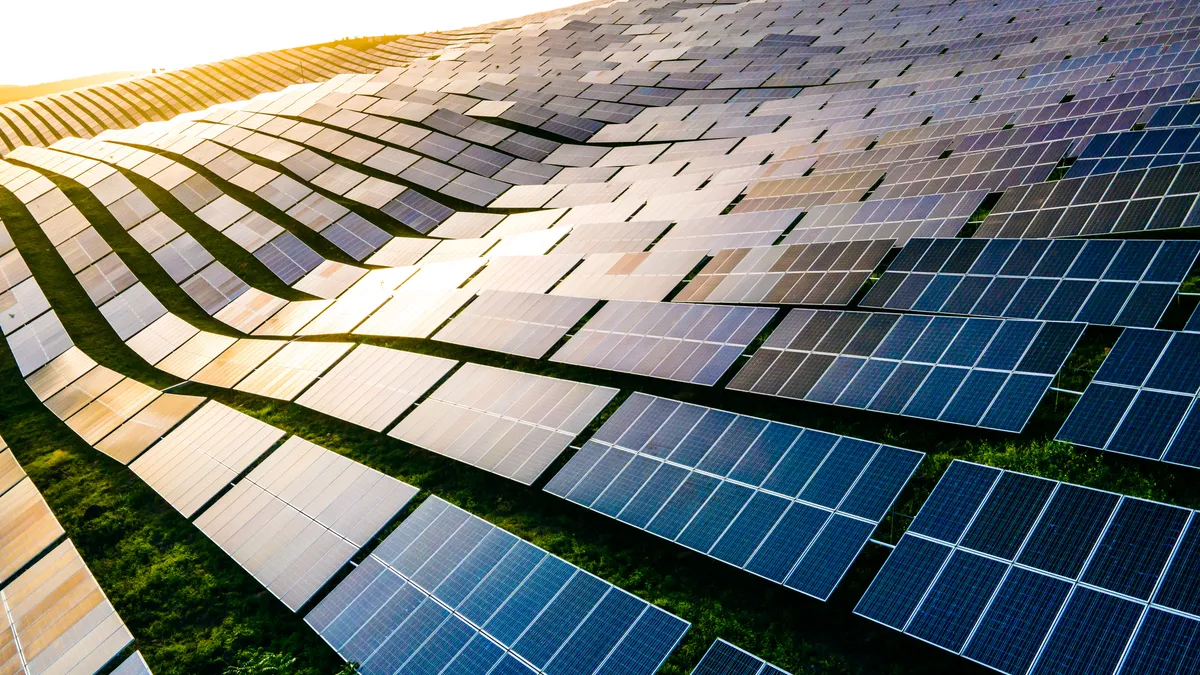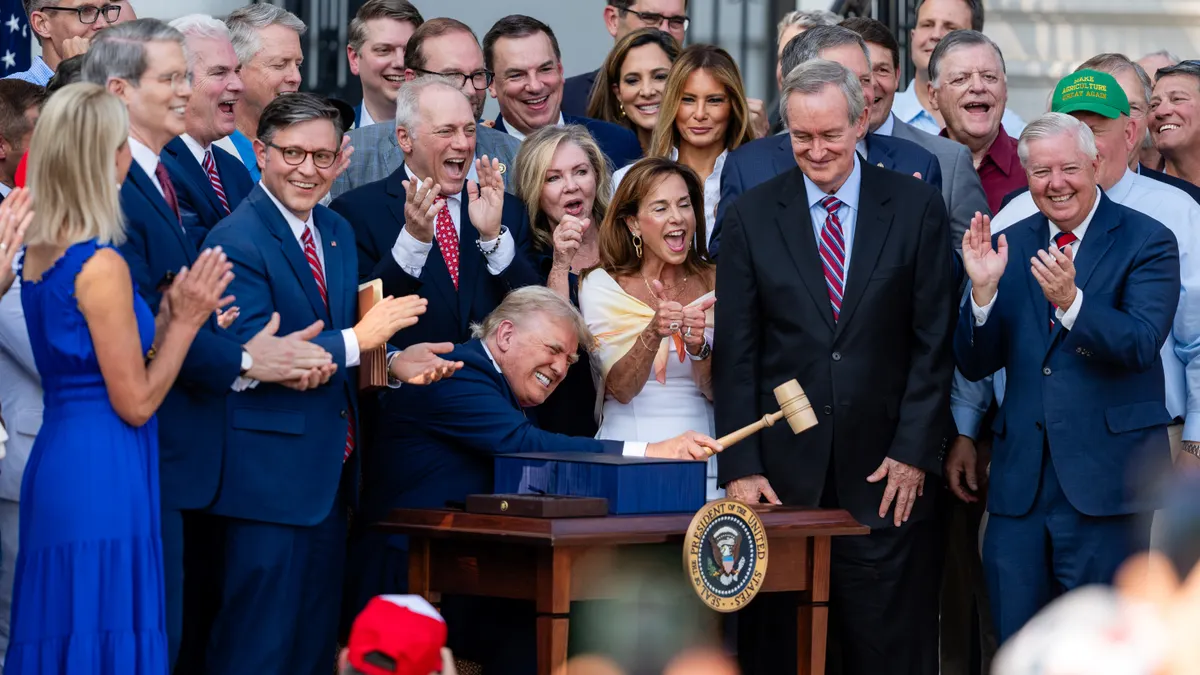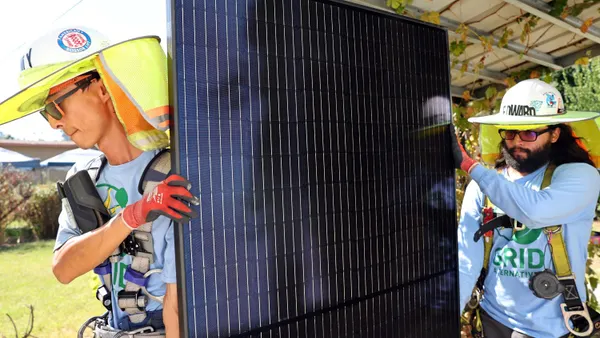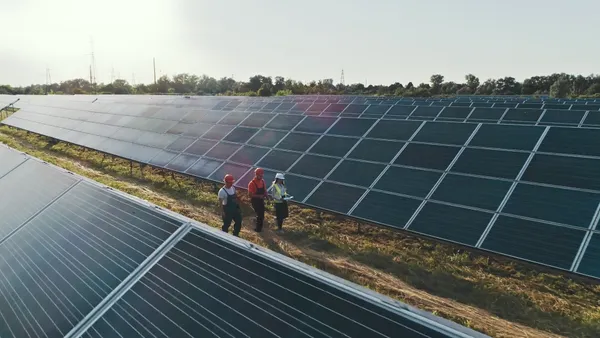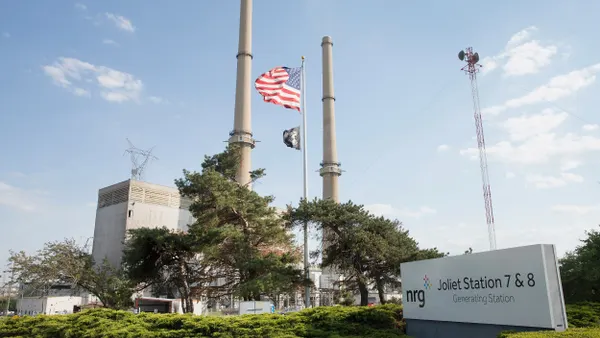UPDATE: May 3, 2022: A bipartisan group of 22 senators wrote to President Joe Biden to urge an expedited determination on the Commerce Department's solar anti-dumping investigation in Southeast Asia. "Initiation of the investigation is already negatively impacting the U.S. solar industry, and the longer this situation persists, the more acute the damage will be," according to a letter sent on May 1, quoting industry impacts reported by Wood Mackenzie.
The senators joining the petition included Sens. Dianne Feinstein, D, and Alex Padilla, D, representing California, the state where Auxin Solar, the manufacturing company that filed for the anti-dumping investigation, is based.
UPDATE: April 27, 2022: U.S. solar capacity deployment in 2022 and 2023 is expected to fall by 24 GW after the Commerce Department initiated an anti-dumping investigation in Southeast Asia, according to new analysis from the Solar Energy Industries Association.
Looking beyond the next two years, more than 700 SEIA survey respondents confirmed 318 projects are being canceled or delayed as a result of the federal investigation, totaling 51 GW of solar and 6 GWh of paired battery storage capacity, putting $52 billion of private investment in renewables at risk.
UPDATE: April 8, 2022: The Solar Energy Industries Association published survey results on Thursday from over 400 respondents showing that 78% of their expected module supply has been delayed or canceled since the Commerce Department initiated an anti-dumping investigation of solar exports from Cambodia, Malaysia, Thailand and Vietnam.
Dive Brief:
- The Solar Energy Industries Association is calling on the Department of Commerce to immediately issue a negative preliminary decision in the anti-dumping and countervailing investigation of solar photovolatic imports from Cambodia, Malaysia, Thailand and Vietnam.
- The investigation, prompted by a February petition from California-based manufacturer Auxin Solar, could take up to a year for a final ruling, causing developers to scramble for changes in their panel supply as shipments are delayed or canceled due to uncertainty over the investigation, which could result in retroactive import duties.
- "It happened eight days ago and we're already seeing impacts from this decision to initiate an investigation," SEIA President and CEO Abigail Ross Hopper said during an online event on Tuesday. "We're already seeing a rapid degeneration of the U.S. solar industry as panel suppliers stop shipping to the United States."
Dive Insight:
U.S. solar developers are looking around the world for alternatives to the four countries subject to the Department of Commerce investigation to source their pipelines of solar projects, with large developers leaning on their resources and relationships to navigate the issues.
"While some of NextEra Energy's solar and storage projects may be adversely impacted by the disruption this decision is expected to cause, we will work closely with our suppliers and customers to assess the potential impacts of this investigation and remain confident in our ability to arrive at acceptable mitigation measures," NextEra said in a statement on Tuesday.
The Auxin petition charges that components and panels manufactured in China are bypassing tariffs through Southeast Asian countries, and Akin Gump Strauss Hauer & Feld partner Matt Nicely, representing SEIA, foresees difficulties in tracking and establishing that other countries and suppliers aren't similarly utilizing such parts to also bypass the tariffs that have been imposed on Chinese solar manufacturers.
"I don't think any particular developer is untouched," Dan Siegel, CEO of the utility-scale solar company Birch Creek Development, told Utility Dive. "We are fortunate in the sense that .... we don't have anything on a boat right now," he added, but this will impact timelines for 2023 construction plans.
SEIA and others in the solar sector have been vocal in opposing the investigation, alleging that it would not provide the incentives needed to develop solar manufacturing in the U.S., where there is not adequate supply for the growing solar demand.
"It's not a policy that creates an incentive to manufacture in the U.S. It creates an incentive to manufacture at lowest cost anywhere else," Siegel, a former renewable energy business development executive at U.S. Bank, said of the Commerce Department's investigation.
The U.S. solar industry has faced uncertainty in recent years with Section 201 tariffs imposed initially by the Trump administration for PV panels and crystalline-silicon modules manufactured in China. SEIA had advocated for the tariffs to get greatly reduced, if not revoked. The Biden administration extended the tariffs for four years in February, with an exception for the more efficient bifacial panels. While solar advocates were disappointed with the tariff extension, some analysts said these tariffs have not impacted the record-setting years of growth in the solar sector in recent years.
"We have not noted any impacts of tariffs on investments in the past five years," Raj Prabhu, CEO of clean energy research firm Mercom Capital Group, said in an email.
This changed with the Commerce Department's investigation of exports from Cambodia, Malaysia, Thailand and Vietnam, as shipments soon began to be withheld by suppliers. The anti-dumping and countervailing investigation made an immediate impact on imports and duties can also be applied retroactively if Commerce issues a positive determination.
SEIA said 74% of more than 200 respondents from a survey on the impact of the Commerce investigation said PV module shipments have been delayed or canceled.
SEIA received over 200 responses in two days after launching the survey. The early snapshot includes many market segments, and more than 90% of the companies polled reported on negative impacts to their bottom line.
Only 10 residential developers had answered the survey at the time of Utility Dive's inquiry, but that might be because the "residential space is one-layer insulated," and many buy through U.S. distributors instead of importing solar panels, Justin Baca, SEIA VP of markets and research, said during the webinar.
"The threat of these duties being imposed retroactively ... is the reason for many companies deciding to stop shipping," Matt Nicely, partner at Akin Gump Strauss Hauer & Feld, the firm representing SEIA, said during the webinar on Tuesday.
"The uncertainty around the case is already a cause for negative sentiment in the market. A positive ruling could cause investments to slump and demand to decline," Prabhu said.
"Commerce has changed its mind between a preliminary and a final decision in the past," Julia Eppard, Akin Gump counsel, said on the webinar. According to her, there are no examples of the agency making a negative preliminary determination and a positive one in the final.
SEIA plans to update its industry impact survey on Thursday.



